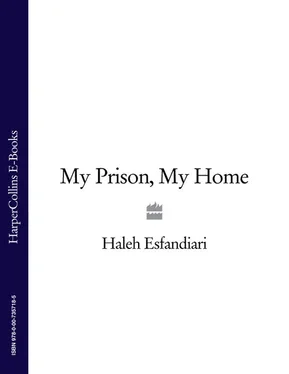I was shattered. I had been told it would only take three days. But far more important, I knew that “the President’s Bureau” was a euphemism for the Ministry of Intelligence and Security. I was familiar with the ministry’s fearsome reputation. It was responsible for internal security, and was the regime’s political watchdog, its secret police. It harassed intellectuals, journalists, and even the mildest of dissidents; it made arrests. It had been responsible for disappearances, even assassinations. Still, I convinced myself this merely meant more forms and interviews and, certainly, more delays.
I was directed to see a Mr. Torabi in the same building. Farhad and I went downstairs, found the office marked President’s Bureau, entered rooms which turned out to be quite well furnished, and asked for Mr. Torabi. I do not know if this was his real name or a fictitious one, as was often the case with Intelligence Ministry officials I later encountered. Mr. Torabi was not there. When I went in the following day, he was not there, either. “You just missed him. He won’t be back till Wednesday,” I was told. I felt that I was being sent after black beans, as the Persian expression goes—being given the runaround.
At home, I canceled my airline reservation and once again telephoned Shaul. “There will be a two-week delay,” I told him. “We have to find someone who can expedite things.” In Iran, contacts—and money—are crucial in situations like mine. Shaul promised to make phone calls. Over the next four months, I would make, cancel, and remake these same airline reservations several times, each one a marker on the barometer of my rising, and then dashed, hopes.
I had expected to spend New Year’s Eve with my husband and our family in Washington; I was now spending it with Mutti in Tehran. My mother loves festive occasions: birthdays, Christmas, New Year’s, the Iranian new year festival, Nowruz. As a child I learned to love these chances to bring people together, to enjoy the company of family and friends, to laugh and tell stories, and, like Mutti, I was punctilious about observing them. In our household, failure to telephone a relative on a birthday or to mark a celebration was a serious matter. Shaul often teased me about the importance I attached to such gestures. Although Mother and I decided to stay home, I wanted to make New Year’s Eve as joyful for her as possible.
I walked to the fancy new grocery store a block from my mother’s apartment and bought salmon and caviar. We set the table with a beautiful tablecloth and Mother’s best Rosenthal china, which she kept in a special cupboard in her apartment. Dinner, however, turned out to be a somber affair. Unease hovered over the table. Both my mother and I sensed that the normal order of our lives had been interrupted. Just how very deeply it had been disrupted, neither of us even dimly understood.
The next day I went with Kami to take care of my cell phone, which was now in the hands of my assailants. In Iran, you can buy a cell phone at a variety of stores, but a number has to be purchased from the government phone company. The number is encoded on a chip that is installed in the phone. I had to cancel my old cell phone number and purchase a new one. At the telephone company office, I handed over a batch of documents to a clerk: my “deed” of ownership, the barely legible Xerox copy of my birth certificate as proof of identity, and the police report, duly notarized by the revolutionary magistrate’s court, attesting that my cell phone had been stolen. But here, too, bureaucracy was alive and well. They could cancel my old telephone number, I was told, but they could issue me a new number only if I produced a picture ID—the original, not a Xerox copy. I repeated the obvious: my ID card had been stolen; it would be months before I could obtain a new one. The clerk shrugged. It was not his concern. I’ll be home in two weeks, anyway, I told myself as I left empty-handed.
Finally, on Wednesday, I saw Torabi, the man in the Intelligence Ministry’s “President’s Bureau,” having called the day before to make sure he would be there. He went over the robbery with me again and asked me a few more questions. “Why don’t you step outside and wait for my colleague, Mr. Ja’fari. He wants to talk to you,” he said. I waited in the reception room. After about half an hour, the door behind me opened and a man asked me to come in.
Ja’fari was sitting at a table behind a laptop. He was in his mid-thirties, of medium height, with a bit of stubble on his face. He wore an open-necked shirt beneath a modified safari jacket. A smirk never left his face. His manner alternated between solicitous official—“Tell me again about the robbery”—and faceless bureaucrat—“Date of birth? Identity card number?” He appeared to be reading the questions from his laptop. At first he asked questions and simply nodded at my answers. Then he handed me a sheaf of blank paper, repeated the same questions and posed many others in writing, and instructed me to write down my replies.
Yet, still, I was only slightly uneasy: the attention of the Intelligence Ministry was never welcome, but I had been assured by friends that clearance by the ministry for lost passport applications was routine. Asking for my responses in writing cast the interview in a more serious light, but most of the information was ordinary enough: name, family name, husband’s name, children, employer, salary. A few of the questions seemed unnecessarily intrusive: occupation and employer of husband, daughter, son-in-law, sister, brother. Ja’fari seemed overly interested in the details of my Wilson Center salary: amount, deductions for federal and state taxes and for Social Security and retirement, the biweekly method of payment. Concerned lest my salary, when converted into Iranian, rials seem to him exorbitant, I made all this as convoluted as possible. (Later, on the day of my release, when I saw Ja’fari’s shiny, silver-gray Peugeot, I concluded that I need not have worried. The Intelligence Ministry took very good care of its own.)
I found it odd that Ja’fari wanted the names and ages of my granddaughters, as well as a list of the people I saw regularly in Washington. I came to understand only much later that, in the style of the now-defunct East German secret police, the Stasi, the Iranian secret police collected masses of information, no matter how insignificant or useless, on everyone who happened to attract their attention. As with the Stasi, such information contributed nothing to national security, but fat dossiers were regarded as proof of “thoroughness” and helped inflate the self-regard of the intelligence officers. When Ja’fari asked me if I was married to a Jew, an alarm bell should have gone off, but it didn’t. I failed to catch the implied menace in the question. He has never met a Muslim woman who married a Jew, I thought. Trying to strike a friendly tone, I even offered to show Ja’fari around if he ever came to Washington. Notwithstanding a very few friends’ skeptical attitudes, I still believed I was the victim of an ordinary robbery and this was routine clearance before a new passport could be issued.
Ja’fari ended the interview around noon. I went home, never expecting to see him again. I assumed that my passport would be issued in a few days. But when I picked up the phone in my mother’s apartment the next day, it was Ja’fari at the other end of the line. He instructed me to appear Saturday morning, this time at an Intelligence Ministry office. Mr. Ja’fari, which may or may not have been his real name, was to become my constant but unwelcome “companion” in the weeks and months ahead—an unshakable and controlling presence throughout a terrifying interrogation that would stretch out over the next eight months, nearly four of them spent in solitary confinement at Evin Prison.
Читать дальше












